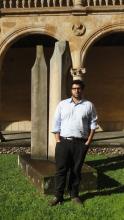Loschiavo Leme de Barros, Marco Antonio

My stay at Oñati Instituto Internacional de Sociología Jurídica (IISJ) as visiting researcher – from January to February 2016 - was very important for the development of some ideas of my doctoral thesis.
My research investigates the consequentialist reasoning in Brazilian law. The consequentialist reasoning can be understood as a way to argue considering a future factual result from a technical-scientific or probabilistic assessment of the effects of a given decision in the legal system (legal consequentialism) or in the society (extralegal consequentialism). The proliferation of this type of reasoning in Brazilian law is related with the rise of progressive legislations (after Constitution of 1988), which depend upon the promotion and action carried out by officials. Nevertheless, all kinds of legal decisions can be justified by their consequences.
When authorities decide based on outcomes – whose occurrence cannot be determined with certainty – two main questions arise. First, why it is necessary consider or not all consequences and, secondly, how to evaluate them. In these circumstances of uncertainness, the authority needs to adopt a descriptive method to help better evaluate the possibilities, whether based on empirical studies or probabilistic – methods that are not typically related with legal reasoning. Thus, one of the main aspects of consequentialist reasoning is the handling with problems of evidence and evaluation, almost related with empirical or probabilistic judgments in decision-making and that justifies further legal empirical research (social network analysis) and compared studies.
There is a lack of consistent studies about the consequentialist reasoning in Brazilian socio-legal theory. The main goal of my research is to contribute to amplify this sociological description about new dynamics of Brazil’s legal system, in particular understand how judges operates with consequentialist arguments in decision-making and what are limitations and difficulties for the Brazilian Supreme Court – Supremo Tribunal Federal. In this sense, I did a great use of the IISJ Library – that has a great range and diversity of authors and journals. I carried out research on social theory of law; legal reasoning and compared constitutional law studies.
I must also highlight that I had a great time in the IISJ and in the Residencia Antia - all professors, staff, students and researchers that I met were friendly - besides the beautiful sourradings of the Aizkorri-Aratz Natural Park.
I would be glad to return to IISJ in another occasion and to contribute with the IISJ community.
All the best,
Marco Antonio Loschiavo Leme de Barros
PhD Candidate from University of São Paulo
